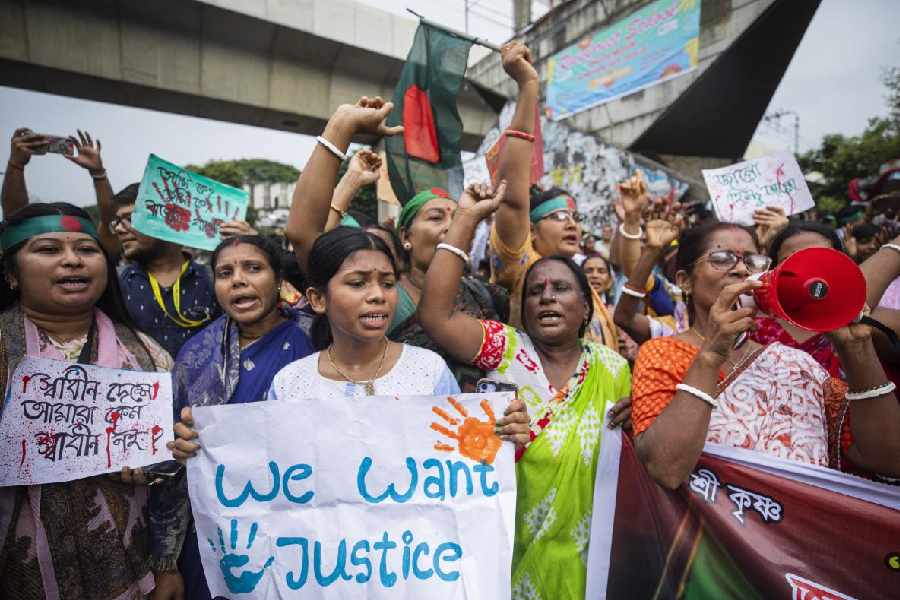Shyama Mondal’s world descended into a cesspool of despair on the night of Aug 5th, a few hours after the sudden resignation and exit of Prime Minister Sheikh Hasina.
"Save us, please, they'll kill us," Shyama's voice cracked as she spoke to The Telegraph Online. There is a palpable terror in her voice. It is a chilling testament to the nightmare that is now her reality.
"It was midnight when they came," she recounts. "Nearly a hundred of them, armed with sticks, machetes, and petrol bombs."
The mob, a mix of familiar faces from the neighbourhood and strangers, descended upon the Mondal family home with unbridled fury. "They smashed everything," Shyama says. Years of memories were shattered into waste in a matter of minutes.
The Mondal family’s ordeal is far from unique. Reports of similar acts of violence against minorities are surfacing across Bangladesh, painting a grim picture of widespread fear and persecution. In response, the newly appointed Chief Adviser, Muhammad Yunus, visited the Dhakeshwari Temple on Tuesday, offering solace and support to the beleaguered Hindu community.
“Rights are equal for everyone. We are all one people with one right. Do not make any distinctions among us. Please, assist us. Exercise patience, and later judge -- what we were able to do and not. If we fail, then criticise us,” Yunus was quoted as saying by The Daily Star.
Nobel peace prize winner Dr. Muhammad Yunus took over as the head of an interim government on August 8, three days after Hasina left the country. His leadership, along with a panel of 17 advisors made up of civil society figures, political party leaders, professors and former student movement leaders, has been met with cautious optimism from the public and media.
Kajol Debnath, a leader of the Bangladesh Hindu Buddhist Christian Unity Council, told PTI, "We have compiled some incidents of the vandalisms in different parts of the country exposing the Hindu and other minority communities to anxiety." The violence has claimed lives, with at least two Hindu leaders affiliated with the Awami League party killed in north-western Sirajganj and Rangpur.
The Bangladesh Nationalist Party (BNP) on the other hand, argues that reports of attacks on minorities in Bangladesh, particularly Hindus, are unfounded. BNP leader Mirza Islam Alamgir dismissed claims of attacks on the Hindu minority in Bangladesh as "very unfortunate propaganda," reported the Economic Times. Alamgir asserted that the reports of communal violence are misleading and do not reflect the reality on the ground.
The violence is not restricted to minorities alone. Awami supporters are riddled with fear after their leader left the country.
“We are not safe here, so many people have been killed. The supporters of Jamat Shibir burnt all the police stations and took arms. They have already killed my uncle and are now trying to kill my brother who is a doctor. We have been hiding since 5th August” an Awami League supporter from Rajshahi, who did not wish to be identified, told The Telegraph Online.
“Sheikh Hasina has informed us that she will return back to the nation. There are still thousands of Awami League supporters still there in the country as it is a prime political party of the nation, we just want peace and we will be back soon,” said Tahodul Islam Hasan, an Awami supporter from Noakhali District, to The Telegraph Online.
“It's crucial to note that the unrest affects various groups across Bangladesh, as governance falters, different motives drive the unrest,” says Dr. Md Nadiruzzaman, an assistant professor at Maastricht University, who has been in Dhaka since July 11, on a whatsapp call with The Telegraph Online, explaining the situation in Bangladesh right now.
Can Dr. Yunus restore peace in Bangladesh? The minorities and Awami supporters are waiting for the answer.










